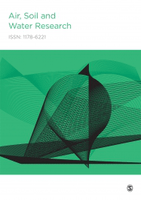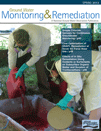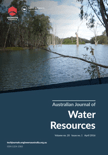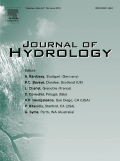
Grundwasser
Scope & Guideline
Advancing groundwater knowledge for a sustainable future.
Introduction
Aims and Scopes
- Hydrogeological Investigations:
Research focusing on the characterization of groundwater systems, including the study of aquifers, groundwater flow, and the interaction between surface and groundwater. - Groundwater Quality Assessment:
Studies that analyze the chemical and isotopic composition of groundwater, identifying contaminants and assessing water quality for various uses. - Sustainable Groundwater Management:
Research dedicated to developing strategies for the sustainable use of groundwater resources, including modeling and management practices to address issues such as over-extraction and pollution. - Climate Change Impact Studies:
Investigations into how climate change affects groundwater recharge, quality, and availability, with a focus on adaptation strategies. - Innovative Monitoring and Modeling Techniques:
Development and application of new methodologies for monitoring groundwater and modeling its behavior under various scenarios, including the use of advanced computational techniques.
Trending and Emerging
- Integration of Groundwater in Urban Planning:
A notable increase in research focusing on the role of groundwater in urban development, emphasizing the importance of sustainable practices and infrastructure that accommodate groundwater resources. - Multi-Method Investigations:
A trend towards using diverse methodologies to study groundwater systems, including isotopic analysis and advanced modeling techniques, which enhance the understanding of complex hydrogeological processes. - Geothermal Energy and Groundwater:
Emerging themes related to the interaction between geothermal energy extraction and groundwater systems, highlighting the potential conflicts and synergies in resource management. - Impact of Climate Change on Groundwater:
Growing emphasis on understanding how climate change affects groundwater recharge, quality, and management strategies, reflecting broader environmental concerns. - Groundwater Contaminants and Microplastics:
Increasing research on emerging contaminants, including microplastics, and their impact on groundwater quality, indicating a shift towards addressing modern pollution challenges.
Declining or Waning
- Agricultural Groundwater Management:
While still relevant, the frequency of studies specifically focused on agricultural water management practices has decreased, possibly due to a broader integration of groundwater management in environmental and climate change discussions. - Historical Hydrogeological Studies:
Research concentrating on historical analyses of groundwater systems has become less prominent, as the current emphasis shifts towards contemporary challenges and technological advancements. - Traditional Water Quality Testing Methods:
Conventional approaches to groundwater quality assessment are being overshadowed by more innovative techniques, such as isotopic and multi-method investigations, leading to a decline in publications on traditional methodologies.
Similar Journals

VADOSE ZONE JOURNAL
Advancing soil science for a sustainable future.Vadose Zone Journal, published by Wiley, is a premier Open Access journal dedicated to advancing research in the dynamic field of soil science, particularly focusing on the vadose zone—the area of soil above the groundwater table that plays a critical role in hydrological processes. Since its inception in 2002, the journal has provided a platform for high-quality, impactful research, reflected in its impressive ranking among the top 25% of journals in the Soil Science category. With an increasing emphasis on sustainable agricultural practices and environmental protection, the Vadose Zone Journal offers invaluable insights and innovative methodologies that cater to the needs of researchers, practitioners, and students alike. Located in Hoboken, NJ, the journal operates on a fully Open Access model since 2018, ensuring that cutting-edge findings are readily accessible to a global audience. Join the community of experts and make significant contributions to our understanding of critical soil processes through this esteemed publication.

BOLETIN GEOLOGICO Y MINERO
Bridging Academia and Earth Science ExpertiseBOLETIN GEOLOGICO Y MINERO is a significant academic journal published by the Instituto Geológico Minero de España, focusing on the fields of Geology and Geochemistry. Established in 1980, this journal provides a platform for researchers to disseminate vital studies and findings in the earth sciences, encompassing an array of topics from mineralogy to environmental geology. Despite its Q4 ranking in both Geochemistry and Petrology and Geology categories as of 2023, the journal serves as a resource for emerging research and innovative methodologies in these critical fields, promoting a deeper understanding of geological processes and materials. While currently operating without an open-access model, the journal is committed to advancing knowledge through rigorous peer-review standards. With its roots in Spain, the BOLETIN GEOLOGICO Y MINERO significantly contributes to the European geological research community and remains an invaluable resource for students, professionals, and researchers alike engaged in the pursuit of geological science.

Carpathian Journal of Earth and Environmental Sciences
Fostering Collaboration in Earth and Environmental ResearchCarpathian Journal of Earth and Environmental Sciences is a distinguished academic journal dedicated to advancing the interdisciplinary field of Earth and environmental sciences. Published by the Carpathian Association for Environment and Earth Sciences, this journal plays a pivotal role in disseminating high-quality research focused on the dynamic interactions between geological processes and environmental changes. With an ISSN of 1842-4090 and an E-ISSN of 1844-489X, the journal is indexed in Scopus and holds an esteemed Q3 quartile ranking in both Earth and Planetary Sciences and Environmental Science categories as of 2023. Since its inception in 2008, the Carpathian Journal has provided an open access platform for researchers, professionals, and students to share insights, foster collaboration, and engage in critical discussions on pressing environmental issues. By continuously contributing to the body of knowledge in this field, the journal not only enhances academic discourse but also promotes sustainable environmental practices across Romania and beyond.

Air Soil and Water Research
Advancing Knowledge for a Sustainable FutureAir Soil and Water Research is a premier open access journal published by SAGE Publications Ltd, dedicated to the interdisciplinary study of environmental science. Since its inception in 2008, this journal has provided a vital platform for researchers and professionals to disseminate findings that enhance our understanding of the interconnectedness of air, soil, and water systems. With an impressive impact factor and a ranking of #43 out of 233 in the General Environmental Science category, the journal proudly occupies the Q2 quartile within its field, demonstrating its influence and contribution to environmental research. The journal's editorial board comprises leading scientists and experts committed to ensuring high-quality publications that address important environmental challenges. Accessible to all, it provides a wealth of knowledge and resources for academics, practitioners, and policymakers looking for innovative solutions to pressing ecological issues.

Natural Resources Research
Leading the way in environmental research and resource management.Natural Resources Research is a premier academic journal that plays a vital role in advancing the field of environmental science, particularly in the management and sustainable use of natural resources. Published by Springer, the journal boasts an impressive impact factor and is currently ranked in the Q1 quartile for Environmental Science, reflecting its significant contribution to knowledge and research in this domain. With a notable ranking of #21/233 in the general environmental science category and a remarkable 91st percentile, it serves as a reputable platform for researchers, professionals, and students seeking to publish and access high-quality research. The journal's archival span from 1996 to 2024 underscores its longstanding commitment to addressing pressing environmental issues, facilitating robust discussions on natural resource policy, conservation strategies, and innovative technological advancements. While the journal is not open access, it ensures wide dissemination of its content, bolstering the critical dialogue necessary for enhanced understanding and action in the field. Natural Resources Research continues to be an essential resource for those dedicated to sustainability and the responsible stewardship of our planet's resources.

Earth and Space Science
Exploring the Frontiers of Earth and Space.Earth and Space Science, published by the American Geophysical Union, is a distinguished open-access journal that has profoundly impacted the realms of earth and planetary sciences as well as environmental science since its inception in 2014. With impressive rankings, including Q1 in both Earth and Planetary Sciences and Environmental Science for 2023, this journal ranks 38th out of 195 in the general Earth and planetary sciences category and 51st out of 219 in environmental science, showcasing its commitment to high-quality research dissemination. The journal serves as a vital platform for researchers, professionals, and students, fostering the exploration of critical topics and advancements within these pivotal fields. With an accessible format, researchers can benefit from the rich content available, furthering their knowledge and ensuring that groundbreaking discoveries reach a broader audience. The journal's ongoing commitment to open access aligns with contemporary trends in scholarly communication, emphasizing inclusion and collaboration in tackling pressing global challenges.

RBRH-Revista Brasileira de Recursos Hidricos
Innovating Solutions for Global Water ChallengesRBRH-Revista Brasileira de Recursos Hidricos is a leading peer-reviewed journal dedicated to the dissemination of high-quality research in the field of water resources, published by the Associação Brasileira de Recursos Hídricos (ABRH). With both ISSN 1414-381X and E-ISSN 2318-0331, this journal has established itself as an essential resource since its transition to Open Access in 1996, fostering widespread accessibility to vital research findings. Based in Brazil, the journal serves a global audience, embodying a commitment to the study and management of aquatic systems, including their dynamics and technological solutions. As part of its rigorous academic contributions, it has achieved Q3 rankings across categories such as Aquatic Science, Earth-Surface Processes, Oceanography, and Water Science & Technology, reflecting its impact and relevance in these domains. Researchers, professionals, and students are encouraged to engage with the journal's diverse array of studies from 2016 to 2024, consolidating knowledge on crucial water resource challenges and innovations.

GROUND WATER MONITORING AND REMEDIATION
Advancing groundwater science for a sustainable future.GROUND WATER MONITORING AND REMEDIATION, published by WILEY, is a pivotal journal in the fields of Civil and Structural Engineering and Water Science and Technology, boasting an impressive Q2 category ranking according to the latest 2023 metrics. This esteemed journal aims to advance scientific knowledge and practice related to groundwater management and remediation strategies, providing a platform for researchers, professionals, and students to share groundbreaking findings and methodologies. With its extensive collection of peer-reviewed articles since its inception in 1981, GROUND WATER MONITORING AND REMEDIATION contributes significantly to the understanding and improvement of groundwater systems worldwide. Although it operates under a traditional subscription model, the accessibility of its high-quality content ensures that it remains a vital resource for those dedicated to addressing contemporary challenges in groundwater science. Adhering to strict academic standards, the journal is instrumental for professionals aiming to achieve excellence in the increasingly relevant field of environmental sustainability and water resource management.

Australasian Journal of Water Resources
Empowering Researchers to Tackle Water ChallengesThe Australasian Journal of Water Resources, published by Taylor & Francis AS, stands as a pivotal resource in the field of water science and technology. With an ISSN of 1324-1583 and E-ISSN 2204-227X, this esteemed journal facilitates the dissemination of high-quality research articles that address critical issues facing water resources management across Australasia and beyond. Ranking in the Q2 category for Water Science and Technology as per the 2023 metrics, it boasts an impressive Scopus ranking of 75/261 in Environmental Science, placing it in the 71st percentile for its field. Spanning from 2008 to 2024, the journal emphasizes the importance of sustainable water practices, innovative technologies, and environmental policy, making it an invaluable asset for researchers, professionals, and students seeking to advance their knowledge and contribute to the discourse on water management challenges. The journal's rigorous peer-review process and commitment to open academic dialogue ensure that emerging trends and pioneering ideas receive the attention they deserve.

Journal of Hydrology
Pioneering Research in Hydrological ProcessesThe Journal of Hydrology, published by ELSEVIER, stands as a premier outlet for scholarly research in the field of water science and technology. With an impactful history dating back to 1949 and a convergence period extending to 2024, this journal has consistently provided a platform for cutting-edge research that shapes our understanding of hydrological processes and their implications. Located in the Netherlands, its commitment to excellence is underscored by its impressive Scopus rank of 15 out of 261 in the Environmental Science category, placing it in the 94th percentile overall, and achieving a prestigious Q1 category allocation for 2023. While the journal does not currently offer open access options, it remains an invaluable resource for researchers, professionals, and students seeking to deepen their expertise in hydrology. The rigorous peer-review process ensures the publication of high-quality manuscripts that contribute significantly to the advancement of knowledge in this critical domain.